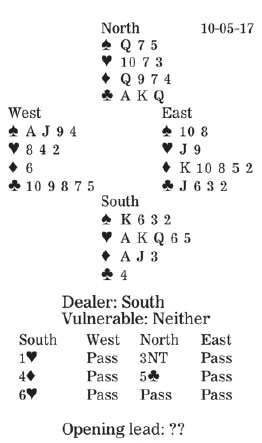Colorless collection counsels caution
Charles Caleb Colton, an eccentric English cleric who became a wine merchant and gambler, and committed suicide in 1832, said, "Deliberate with caution, but act with decision; and yield with graciousness, or oppose with firmness."
Bridge players with balanced hands should act with caution, because the losers tend not to evaporate. In this deal, North's three-no-trump response showed 13-15 points with 4-3-3-3 distribution, three-card heart support and a hand that might play better in three no-trump than in four hearts - perfect. What should South have done then?
He had slam potential, but how much club power was wasted in partner's hand? It would have been great if South could have rebid four clubs to show his singleton, but no one has that agreement. Instead, South control-bid four diamonds. Maybe North should have settled for four hearts, but he continued with five clubs. Then South, with the spade king, took a shot at six hearts.
Now the spotlight moved to West. What should he have led?
Sometimes, you must lead an ace to beat a small slam; at others, leading that ace is fatal - more often the latter is true, I believe.
Here, any card but a spade defeats six hearts, assuming when declarer leads a spade toward dummy's queen, West plays his nine, which must be correct. If East has the king, he will take the trick. If South has the king (as the bidding suggests), rising with the ace gives declarer two spade tricks; waiting hopefully gives West two winners with his ace and jack. Then South will rue not having the diamond 10.



















